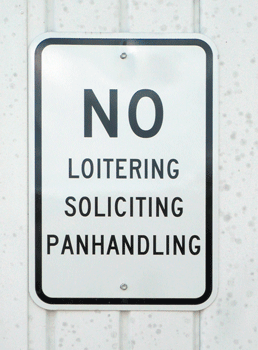 A group of protestors turned out at Fayetteville City Council’s June work session, objecting to the council’s plans to ban the homeless from sleeping or camping on city property.
A group of protestors turned out at Fayetteville City Council’s June work session, objecting to the council’s plans to ban the homeless from sleeping or camping on city property.
Police Chief Gina Hawkins told Up & Coming Weekly about a man who camps out regularly at the main entrance to police headquarters. Hawkins said “Larry” used to camp next to a local church, but he had to move. He chose the spot next to the front door of the Hay Street police station. The chief said she had no objection to the homeless man staying there, adding that the homeless and others who live on the street have not created crime problems in their day-to-day living.
A couple dozen members of Seth’s Wish, a local nonprofit, protested with large signs in front of City Hall before council’s meeting began. The group’s founder, Lindsey Wolford, described her group as an organization whose purpose is to “help the homeless and hungry in Fayetteville.” She said the organization recently opened a community center on S. Cool Spring Street and, during May, provided those in need 1,171 hot meals and gave away 731 bags full of groceries.
Wolford said Seth’s Wish works closely with Fayetteville’s Second Harvest Food Bank and accepts donations only from private sources. She said the impoverished who live on the street are not criminals and that “the city should not criminalize them by regulating where they can live.”
City Council heard a brief presentation during its work session from Assistant City Attorney Lisa Harper, who said five large North Carolina cities have ordinances regulating camping and sleeping on public property. She was not able to provide information about why those cities established their ordinances and whether they’ve done any good, as requested by Councilman Bill Crisp.
City Manager Doug Hewett suggested that his office come up with a plan that “balances some regulation against no regulation,” saying that warmer weather had resulted in more people sleeping on downtown sidewalks and in alcoves — to the objection of businesspeople.
Estimates are that about 300 homeless people have been accounted for in Fayetteville. “The county should take the lead,” said Councilwoman Tisha Waddell, noting that health and human services are responsibilities given North Carolina’s 100 counties by state law.
Homelessness is a matter of “choice or circumstance” for most people who live on the street, she said, adding that for many, “this has become a lifestyle.”
“The best solution is to solve the problem,” Councilman Jim Arp said, noting that public safety issues and unsanitary conditions result from the homeless camping in public. He said city government should combine compassion with problem-solving.
The downtown area is part of Councilman Dan Culliton’s district. He suggested that the administration study the needs of the homeless and how best to accommodate them while at the same time protecting the public. He asked in his motion that city staff come up with proposals for council’s consideration at its August work session.